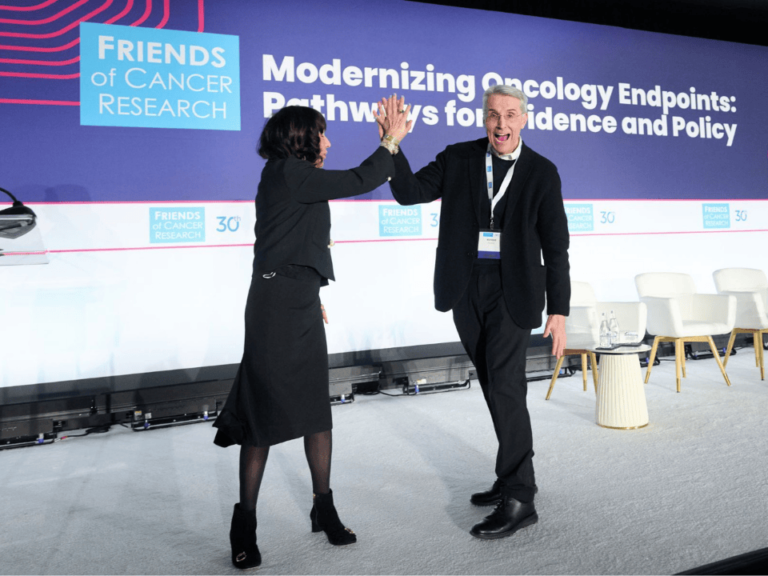THE AMERICAN ASSOCIATION FOR CANCER RESEARCH has named its 2014 class of elected fellows of the AACR Academy. The fellows will be inducted at the association’s annual meeting in San Diego, April 5-9.
The academy recognizes individuals who have made exceptional contributions to cancer research and cancer-related biomedical science.
Members of the AACR Academy 2014 class of fellows are:
- Jerry Adams, joint head of the Molecular Genetics of Cancer Division and director of the Leukemia and Lymphoma Society Specialized Center of Research, Walter and Eliza Hall Institute of Medical Research, in Melbourne, Australia.
- James Allison, professor and chair of the Department of Immunology, director of the Immunology Platform, and deputy director of the David H. Koch Center for Applied Research in Genitourinary Cancers, Department of Genitourinary Research at MD Anderson Cancer Center.
- Mariano Barbacid, professor of molecular oncology of the Centro Nacional de Investigaciones Oncológicas, in Madrid, Spain.
- José Baselga, physician-in-chief of Memorial Sloan Kettering Cancer Center.
- Stephen Baylin, deputy director and associate director for research, Sidney Kimmel Comprehensive Cancer Center; Virginia and D.K. Ludwig professor for cancer research and medicine and chief of the Cancer Biology Division at Johns Hopkins University School of Medicine.
- Günter Blobel, John D. Rockefeller Jr. professor in the Laboratory of Cell Biology of The Rockefeller University and an investigator for the Howard Hughes Medical Institute.
- David Botstein, Anthony B. Evnin professor of genomics at Princeton University; chief scientific officer of Calico.
- Joan Brugge, Louise Foote Pfeiffer professor of cell biology and chair of the Department of Cell Biology at Harvard Medical School.
- Lewis Cantley, Margaret and Herman Sokol professor and director of the Meyer Cancer Center at Weill Cornell Medical College.
- Pierre Chambon, honorary professor of the Collège-de-France; professor of molecular biology and genetics at the University of Strasbourg Institute for Advanced Study; group leader of the Institut de Génétique et de Biologie Moléculaire et Cellulaire.
- Hans Clevers, professor in medical genetics at the University of Utrecht; president of the Royal Netherlands Academy of Arts and Sciences.
- James Darnell Jr., Vincent Astor professor emeritus and head of the Laboratory of Molecular Cell Biology at The Rockefeller University.
- Titia de Lange, Leon Hess professor, American Cancer Society research professor, and director of the Anderson Center for Cancer Research at The Rockefeller University.
- Vincent DeVita Jr., Amy and Joseph Perella professor of medicine at Yale Cancer Center; and professor of epidemiology and public health at Yale Medical School.
- Lawrence Einhorn, distinguished professor of medicine and Lance Armstrong Foundation professor of medicine at the Indiana University School of Medicine.
- Stephen Elledge, Gregor Mendel professor of genetics and medicine at Harvard Medical School and Brigham and Women’s Hospital.
- Ronald Evans, professor and director of the Gene Expression Laboratory and March of Dimes chair in molecular and developmental biology at The Salk Institute for Biological Studies and an investigator for the Howard Hughes Medical Institute.
- Andrew Fire, George D. Smith professor in molecular and genetic medicine at Stanford University School of Medicine.
- Emil Freireich, Ruth Harriet Ainsworth chair, distinguished teaching professor, director of the Adult Leukemia Research Program, and director of the Special Medical Education Programs at MD Anderson Cancer Center.
- Robert Gallo, Homer and Martha Gudelsky distinguished professor of medicine, professor of medicine and of microbiology and immunology, and director of the Institute of Human Virology at the University of Maryland School of Medicine.
- Douglas Hanahan, director of the Swiss Institute for Experimental Cancer Research.
- Richard Hynes, Daniel Ludwig professor for cancer research at the Massachusetts Institute of Technology and an investigator for the Howard Hughes Medical Institute.
- William Kaelin Jr., professor of medicine at Dana-Farber Cancer Institute and Harvard Medical School and an investigator for the Howard Hughes Medical Institute.
- Kenneth Kinzler, professor of oncology and director of the Ludwig Center at Johns Hopkins University Kimmel Cancer Center.
- Richard Kolodner, member and head of the Laboratory of Cancer Genetics of the Ludwig Institute for Cancer Research and distinguished professor in the Departments of Medicine and Cellular and Molecular Medicine at University of California, San Diego School of Medicine.
- Ronald Levy, Robert K. and Helen K. Summy professor of medicine at the Stanford University School of Medicine.
- Frederick Li, professor of clinical cancer epidemiology emeritus at the Harvard School of Public Health and professor of medicine emeritus at Dana-Farber Cancer Institute.
- David Livingston, deputy director of the Dana-Farber Cancer Institute, chief of the Charles A. Dana Division of Human Cancer Genetics, and Emil Frei professor of genetics and medicine at Harvard Medical School.
- Paul Marks, president emeritus of Memorial Sloan Kettering Cancer Center.
- Peter Nowell, Gaylord P. and Mary Louise Harnwell professor emeritus in the Department of Pathology and Laboratory Medicine at the University of Pennsylvania Perelman School of Medicine.
- Christiane Nüsslein-Volhard, director of the Department of Genetics at the Max Planck Institute for Developmental Biology, in Tübingen, Germany.
- Sir Richard Peto, professor of medical statistics and epidemiology at the University of Oxford.
- Charles Sawyers, chair of the Human Oncology and Pathogenesis Program and member at Memorial Sloan Kettering Cancer Center; professor at the Weill Cornell Graduate School of Medical Sciences; and an investigator for the Howard Hughes Medical Institute.
- Sir Michael Stratton, director of the Wellcome Trust Sanger Institute in Cambridge, U.K.
- Axel Ullrich, director of the Department of Molecular Biology of the Max Planck Institute of Biochemistry, in Munich, Germany.
- Inder Verma, Irwin and Joan Jacobs chair in exemplary life science and American Cancer Society professor of molecular biology at The Salk Institute for Biological Sciences.
- Irving Weissman, director of the Institute for Stem Cell Biology and Regenerative Medicine, director of the Stanford Ludwig Center for Cancer Stem Cell Research and Medicine, and professor of pathology and developmental biology at the Stanford University School of Medicine.
- Owen Witte, director of the Broad Stem Cell Research Center and distinguished professor of microbiology, immunology, and molecular genetics at University of California, Los Angeles. and an investigator for the Howard Hughes Medical Institute.











